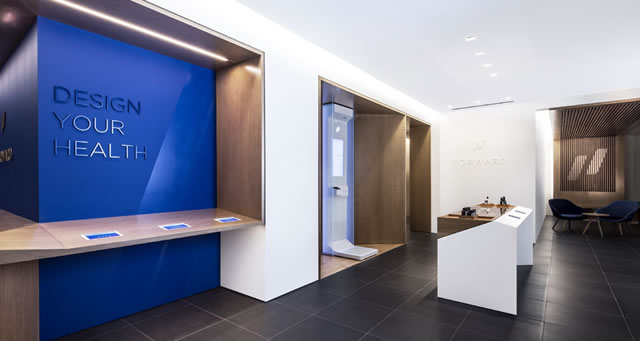New Concierge Startups Could Devastate The Cosmetic Medicine Market
/Futuristic new startups in concierge medicine could really put the screws to competitors as they expand their offering.
Silicon Valley is rife with startups looking to disrupt all aspects of healthcare, moving from traditional approaches to entirely new delivery systems and business models. The result is a number of new, well financed competitors that don't have the baggage of traditional methodologies and can easily adopt new methodologies and could bury existing competitors. Here are a couple of examples.

Forward is a new tech concierge medical start-up San Francisco that is focusing on reinventing the primary care clinic. With something of a clean look that founder Adrian Aoun describes as something aking to an Apple store crossed with Star Treks next generation sick bay. Physicians have access to some really cool gizmos, from a wall-sized screen to visualize and show patient data to automated speach recognition that transcribes converstaions in real time and adds them to patient records. Patients can get their prescritions filled in the on-site pharmacy and can text staff around the clock (with 30 second response times).
But the biggest value is not the glass and white walls, it's the removal of trivial tasks that prevent clinicians from operating at the top of their license. According to a 2016 study in the Annals of Internal Medicine, physicians spend more than half of their time on paperwork, compared to a measly 27% interacting with patients. (Read the study here)
Forward is using technology to ruthlessly elimiate waste and improve physician productivity while also delivering what patients are asking for with whiz-bang tools. They currently don't taken insurance - although they have plans to change that - and charge patients $149/month all in.
Of course Forward is joining a number of other primary care and concierge competitors.
One Medical is another that already has a number of locations. It's not quite as technically cool but it's also getting traction by delivering what patients want - same day appointments, online access, and 24/7 virtual care - at the even more affordable price of $149 per year.
And that brings us to telemedicine and what's happening there.
Read the 2015 Telemedicine Report from Medical Spa MD
In a poll asking dermatologists if they were to use telemedicine in their practice, 41.84% were opposed to the idea of adopting it. Only 38.1% were in favor in using telemedicine, but that may be changing.
In a study by Wilson and Maeder (2015), teledermatology has produced positive outcomes with user satisfaction and uptake, and hopeful in the idea of improvements with healthcare. Another study mentions the benefits of using teledermatology, which could serve as an educational tool.
Despite study findings about telemedicine’s ability to diagnose illnesses, it is still met with resistance. In another study referenced by the authors, it seems that while it can screen and diagnose illnesses, it faced a challenge with an accuracy. Bashur et al., (2015) also suggest the same finding that inaccuracy could be a common challenge when using teledermatology.
According to the Wall Street Journal, the American Telemedicine Association expected the number of physicians using telemedicine to rise approximately 30% more. Healthmine has conducted a poll saying that out of 1500 physicians, only 15% employed telemedicine.
What does this mean for cosmetic / aestheitic practices?
These new startups are going to be under increasing pressure to find ways to generate revenue Forward, for example, has already raised $30m from venture capitalists and needs to get to a value of more than $100m to raise additional funding.
The likely result is that they, like others before them, will see that cosmetic medicine is primarily a cash fee-for-service business that will need little additional investment to add. Since these new competitors are built to deliver such extrodinalry patient satisfaction it will be more than just a little challenging for stand-alone clinics to compete.
Of course their success is not yet assured and they could implode if they can't meet their revenue needs.
If they can, there will be a period of adoption but they will be riding the wave of transformative care that is coming.





